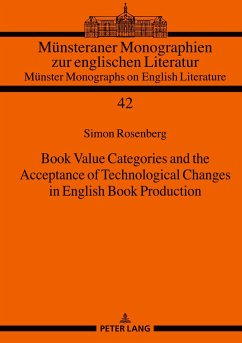For more than 20 years now, the publishing industry has been highly influenced by innovations in digital technology. This is not the first time that technological changes affect the book trade. Both the printing press and industrialized production methods vitally changed the book industry in their time. With a macroscopic, comparative approach, this book looks at the transitional phases of the book of the fifteenth and nineteenth centuries to locate distinctive patterns in the acceptance of new technologies. Using specific book value categories, which shape the acceptance context of innovations in book production, helps us find continuities and discontinuities of these patterns. It also offers a better understanding of current developments in publishing in the digital age.
«In Rosenberg's book, I valued clear phrasing, a well demarcated organization, previews and summaries for emphasis, and, above all, erudition [...]. I hear lots of facile discussions of the book as a commodity; this is not one.»
(James E. May, The Eighteenth-Century Intelligencer, October 2020)
(James E. May, The Eighteenth-Century Intelligencer, October 2020)









